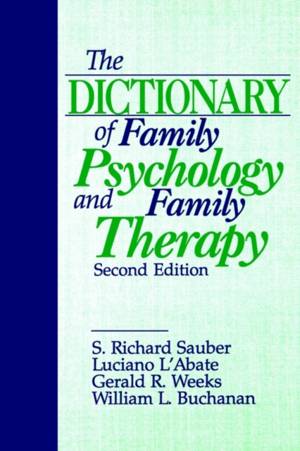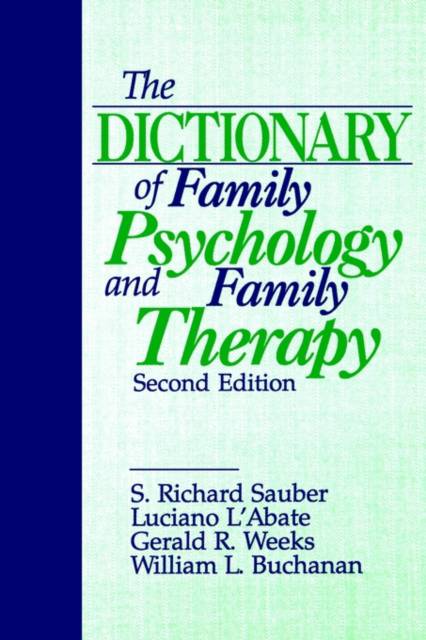
- Retrait gratuit dans votre magasin Club
- 7.000.000 titres dans notre catalogue
- Payer en toute sécurité
- Toujours un magasin près de chez vous
- Retrait gratuit dans votre magasin Club
- 7.000.0000 titres dans notre catalogue
- Payer en toute sécurité
- Toujours un magasin près de chez vous
The Dictionary of Family Psychology and Family Therapy
S Richard Sauber, Luciano L'Abate, William L Buchanan
Livre broché | Anglais
253,45 €
+ 506 points
Description
As the field of the family has expanded, so has the need for an up-to-date volume that pulls together and defines major salient words, phrases, and concepts. This second edition of The Dictionary of Family Psychology and Family Therapy provides an expanded, handy reference for all family professionals--theoreticians, students, researchers, or clinicians. There is no other source like it. Each entry includes a definition of the term, an example relevant to its usage, the origin of the term, an early source using the term, and if pertinent, a recent source. "Borrowed" terms from other such fields as family law, sex therapy, clinical child psychology, and group psychology are also included. The Dictionary of Family Psychology and Family Therapy is an essential resource intended for use by students, faculty, family psychologists, family therapists, and others engaged in the family field. "The authors have succeeded in defining clearly and accessibly the major theoretical, and methodological concepts in the field of family studies, including operational definitions where appropriate." --Clinical Psychology Forum "This wonderful book actually is a dictionary, defining family psychology concepts and terms from A (′abortive runaway′) to Z (′zero-sum game′). . . . Anyone who reads professional material in this field would find this dictionary invaluable. . . . The concise format will allow the reader to stay informed. . . . The application of concepts in examples and the provision of references are invaluable. This book also does a good job of representing, in an unbiased way, different theories or schools of thought. I would recommend The Dictionary of Family Psychology and Family Therapy as a reference for any professional in the family field and see it as a great supplemental text for a graduate course or student." --Family Relations "This is a timely book, and it should be on the library shelves of professionals who deal with people in the areas of clinical practice, research, and education. It should stand alongside textbooks and other dictionaries. It should be read and used as reference and source material. It complements our understandings of human behavior and interactions, particularly the interpersonal and intergroup inevitabilities in families as representing core societies. Workers with families in terms of the psychology and the therapy of such fundamental organizations of genetically and other related people will find in this volume a most valuable asset in furthering their understandings and enhancing their effectiveness as therapists." --Jess V. Cohn, M.D., Emeritus Professor of Psychiatry, University of Miami Medical School, in The American Journal of Family Therapy
Spécifications
Parties prenantes
- Auteur(s) :
- Editeur:
Contenu
- Nombre de pages :
- 488
- Langue:
- Anglais
Caractéristiques
- EAN:
- 9780803953338
- Date de parution :
- 09-08-93
- Format:
- Livre broché
- Format numérique:
- Trade paperback (VS)
- Dimensions :
- 155 mm x 228 mm
- Poids :
- 734 g

Les avis
Nous publions uniquement les avis qui respectent les conditions requises. Consultez nos conditions pour les avis.






